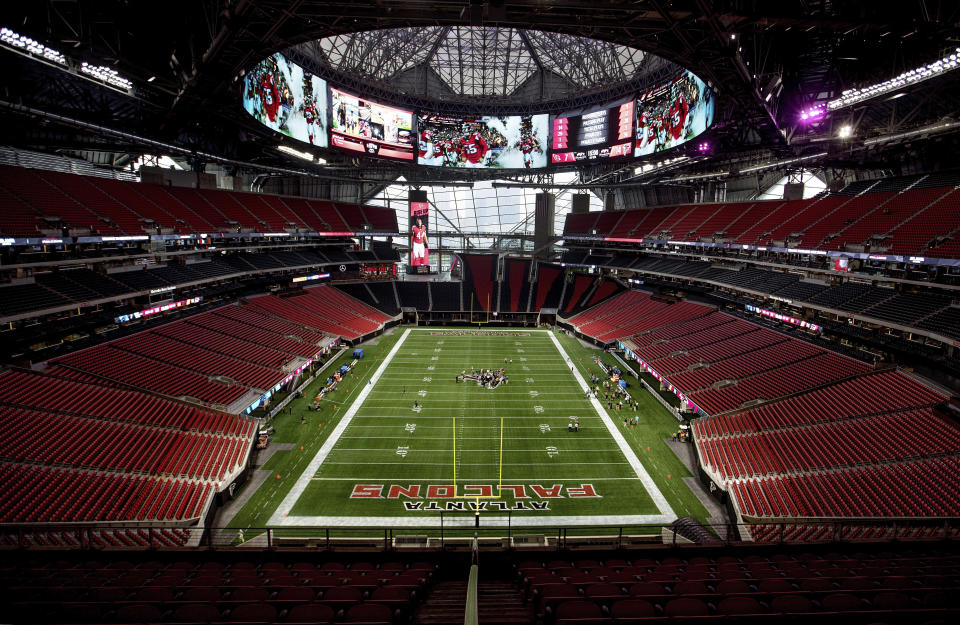Jerry Jones' Taj Mahal is no longer king of college football world
In a meeting room at the Georgia World Congress Center on April 16, 2013, Arthur Blank pressed a red button and unlocked the future of football stadiums.
The button controlled the roof on the stadium model that was built by 360 Architecture as the grand finale to its bid presentation to build the new home of the Atlanta Falcons. When Blank pressed the button, the roof opened in a manner unlike any retractable covering ever seen for a sporting venue – like moving flower petals, or a camera aperture.
“The model only had to work once – when Arthur pushed the button,” said stadium architect Bill Johnson. “It was a great moment.”
Within 48 hours, 360 had won the job to build a $1.5 billion game-changer of a building. Four-plus years later, Mercedes-Benz Stadium is the shiniest new object in American sports.
And because of that, Atlanta has regained its status as America’s capital of college football.
The Dallas-Fort Worth Metroplex had challenged Atlanta’s primacy in recent years. Jerry Jones’ Taj Mahal of a stadium in Arlington became a big-game beacon, luring top college teams for sexy intersectional season openers and hosting a couple of other major-conference tussles per year. Then the Cotton Bowl was cut into the College Football Playoff rotation, and the CFP headquarters opened up in Las Colinas in suburban Dallas. With the Miami Beach Bowl now relocated to Frisco, the Metroplex will host four bowl games this season. And JerryWorld will be the site of the revived Big 12 championship game.
That was enough to give DFW a claim to being the capital of the sport. But Mercedes-Benz Stadium pushes the argument back in Atlanta’s favor.

This is a stadium that will be superior to JerryWorld in terms of bells and whistles (if they eventually can get the roof to open, currently an issue). It will be a destination college programs and their fans want to visit, and there will be no shortage of big games played in it.
Starting pretty much immediately.
The first football game in the place is a Falcons exhibition game Saturday, then we get down to real business. Top-ranked Alabama and No. 3 Florida State meet on Sept. 2 – a matchup so enticing it has been billed as the “G.O.A.T.” — the Greatest Opener of All Time.
Two days later, Tennessee and Georgia Tech play there in a Labor Day night matchup that will draw a ton of eyeballs. And then there is the Southeastern Conference championship game in December, and the Chick-Fil-A Peach Bowl Jan. 1, and then the big enchilada: the CFP national championship game on Jan. 8.
Combine that with the presence of the College Football Hall of Fame, which relocated to Atlanta from South Bend three years ago, and the sport can indeed plant its flag in Atlanta.
“We want to stay that hub of college football,” said Atlanta Falcons president Rich McKay, who became the point man on the stadium project at the behest of Blank. “One way to do it is to build this new building. Atlanta is centrally located in the Southeast to be the hub of college football, and we needed to build something that would allow that to continue. That’s what we think we’ve done.”
Obviously, McKay’s first priority is the Falcons. But the son of legendary former USC coach John McKay has an abundant knowledge of and affinity for the college game as well. The Georgia Dome was a fine home to many college football games, but McKay and Blank wanted to make sure those ties stayed strong moving into the new building.
So McKay visited then-SEC commissioner Mike Slive as far back as 2012 to make sure the league was committed to keeping the kingpin of all conference championship games in Atlanta and in the Falcons’ next stadium. That game is contracted in Mercedes-Benz Stadium through 2026.
But the spectacular nature of the building isn’t the only allure for football fans. It may have cost a fortune to build, but eating and drinking at the game will not cost a fortune. Give the Falcons credit for refraining from gouging the paying public at the concession stands.
The food and beverage pricing should shame every other NFL franchise and major college into rethinking their current rate of highway robbery. At Mercedes-Benz, you can get a bottle of water, hot dogs, pretzels and popcorn for $2; nachos, pizza and peanuts for $3; and a 12-ounce domestic beer for $5.
Hallelujah.
“As we looked at all the basic elements that comprise the gameday experience, we saw a trend in the satisfaction surveys,” said Mike Gomes, the Falcons’ senior vice president for fan experience. “The food and beverage experience finished dead last across the board. Fans didn’t like the pricing or the service. And every stadium that opened has perpetuated that same business model. For some reason, charging a fan $5 for a bottle of water that you can buy for $2 at the grocery store became accepted.
“We took a look at the Masters – one of the most exclusive sporting events in the world, but also with some of the most affordable food and beverage. You can get a beer for $4, a pimento cheese sandwich for $1.50. We wanted something similar. We want fans to say, ‘Somebody has gotten it right for the first time.’ ”
In the process of getting it right with Mercedes-Benz Stadium, the Falcons have gotten it right with the city they call home. Atlanta can once again rightfully claim to be the capital of college football.

